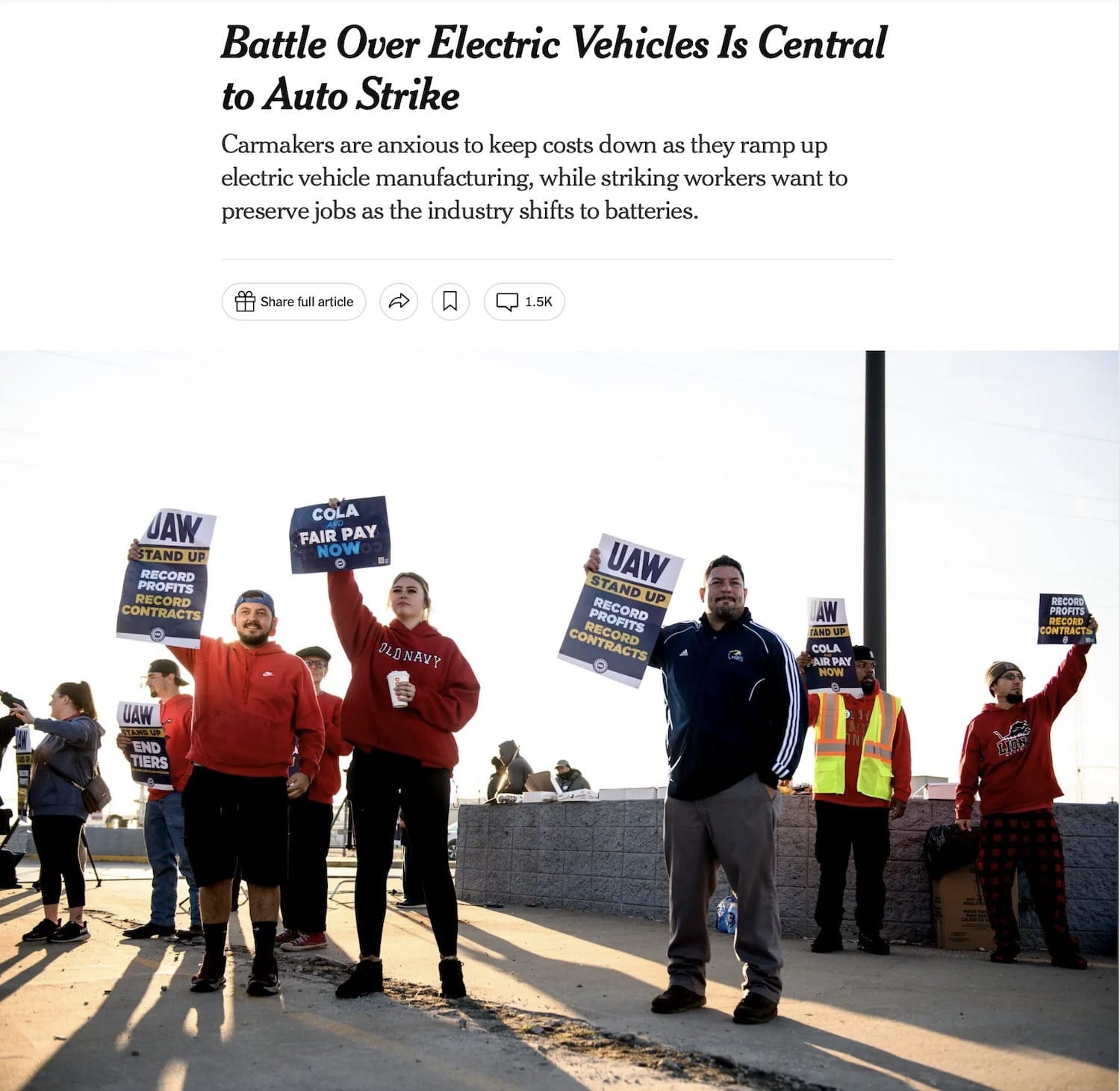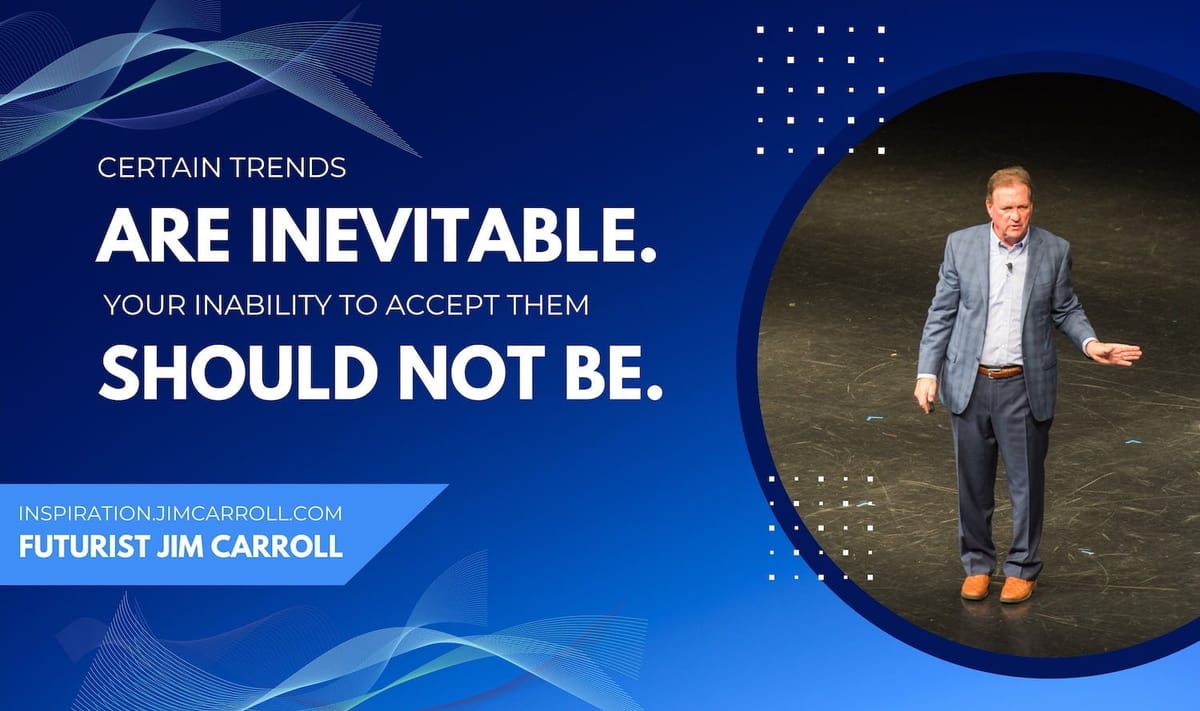The automotive industry strike and the role that electric vehicles are playing within is puzzling, but not surprising.

The New York Times puts it into perspective.
A battle between Detroit carmakers and the United Auto Workers union, which escalated on Friday with targeted strikes in three locations, is unfolding amid a once-in-a-century technological upheaval that poses huge risks for both the companies and the union.
The strike has come as the traditional automakers invest billions to develop electric vehicles while still making most of their money from gasoline-driven cars. The negotiations will determine the balance of power between workers and management, possibly for years to come. That makes the strike as much a struggle for the industry’s future as it is about wages, benefits and working conditions.
The established carmakers — General Motors, Ford Motor and Stellantis, which owns Chrysler, Jeep and Ram — are trying to defend their profits and their place in the market in the face of stiff competition from Tesla and foreign automakers. Some executives and analysts have characterized what is happening in the industry as the biggest technological transformation since Henry Ford’s moving assembly line started up at the beginning of the 20th century.
Battle Over Electric Vehicles Is Central to Auto Strike
New York Times, Sept 16. 2023
This much is true - as I often characterize on stage, the industry is in the midst of a massive transformation as cars become 'big batteries with wheels.' And workers are scrambling to ensure they have a role, which is certainly fair.
But the talks are about more than pay. Workers are trying to defend jobs as manufacturing shifts from internal combustion engines to batteries. Because they have fewer parts, electric cars can be made with fewer workers than gasoline vehicles. A favorable outcome for the U.A.W. would also give the union a strong calling card if, as some expect, it then tries to organize employees at Tesla and other nonunion carmakers like Hyundai, which is planning to manufacture electric vehicles at a massive new factory in Georgia.
“The transition to E.V.s is dominating every bit of this discussion,” said John Casesa, senior managing director at the investment firm Guggenheim Securities, who previously headed strategy at Ford Motor.
“It's unspoken,” Mr. Casesa added. “But really, it’s all about positioning the union to have a central role in the new electric industry.”
For workers, the biggest concern is that electric vehicles have far fewer parts than gasoline models and will render many jobs obsolete. Plants that make mufflers, catalytic converters, fuel injectors and other components that electric cars don’t need will have to be overhauled or shut down
Battle Over Electric Vehicles Is Central to Auto Strike
New York Times, Sept 16. 2023
What is interesting, though, is how politicized the issue has quickly become, with some suggesting that all that has to happen is to scrap the move to EVs altogether - as if that were an actual possibility. (It's not. Horse buggy makers would like to have a word.) With that, it's no surprise the auto companies push back on this mindset.
Union demands would force Ford to scrap its investments in electric vehicles, Jim Farley, the company’s chief executive, said in an interview on Friday. “We want to actually have a conversation about a sustainable future,” he said, “not one that forces us to choose between going out of business and rewarding our workers.”
Battle Over Electric Vehicles Is Central to Auto Strike
New York Times, Sept 16. 2023
The idea of 'stopping' the move to electric vehicles might play well for politics, but as with all things, politics is not reality.
When it comes to the future and trends, certain things are certain. Oil and carbon are over as we transition energy to a world of batteries, renewables, electric vehicles, and smart grids. Insurance is moving from looking back for risk analysis to underwriting risk in real time. A huge portion of the skilled workforce will never return to the office. Construction is moving to a world in which more of the assembly is done off-site. Healthcare is moving to a model in which we no longer just fix people after they are sick, but one that through preventative genomic and diagnostic medicine, we have a good sense of what they might become sick with - and act in advance.
And most automobiles in the future will be ... big batteries on wheels, with computers inside. It's inevitable. Certain things are certain.
The frustration, worry, and concern of the auto workers are understandable, and it certainly is a battle royale. But on the other hand, nothing will happen that will slow the move to EVs, and it is sad to see this become one of those politicized battles with little honesty. The fact is, if the move to EVs doesn't happen in North America, it sure as heck will happen in China, Asia, and other countries. North American automakers - and the North American economy - will be far worse off.
It is sad to see members of the union being fed the lie that the secret to their future is stopping it. That never works. And the fact is, the road to the future always is messy - that's the sometimes sad and undeniable truth. Yet what is also undeniable is that while you can choose to battle the future, the future always wins.
Futurist Jim Carroll never tries to take a side in a complex future by simply taking the side of the inevitable future.

